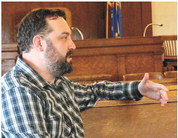Schools’ attorneys dispute petition
By Kevin O’Brien
Wisconsin state law gives school districts the right to impose mask mandates in order to protect the health of students, staff and visitors, according to attorneys for the Colby School District in response to a petition submitted by parents earlier this month.
The petition, signed by over 100 parents and others, demanded that the district lift a mask mandate it imposed on Sept. 27 or face possible litigation over alleged constitutional infringements.
“In our view, the District has acted within its statutory powers in enacting the mask mandate and it has not infringed upon anyone’s constitutional rights,” the attorneys write. “As such, we respectfully disagree with the legal conclusions as stated in your October 4 petition/letter.”
In the Oct. 14 response from attorneys Sven Strutz and Stephen Weld, the district’s legal counsel explains how state statute gives the district the authority to require masks to be worn without violating constitutional rights. It cites Wisconsin State Statute 120.13, which says school boards “may do all things reasonable to promote the cause of education” including making rules “pertaining to the dress and conduct of pupils.”
“A mask mandate is not conceptually different from a school dress code,” the attorneys wrote. Statute 120 also grants school boards the right to adopt rules that apply to anyone who enters into a school building.
“Requiring persons in a school building to wear a mask would be a rule within the scope of this broad statutory grant of authority,” the attorneys write.
Another statute cited by the attorneys says school boards shall “provide safe and healthful facilities.” The attorneys point out that a mask mandate is in line with “unanimous guidance” given by federal, state and local health authorities for controlling the spread of COVID-19.
Imposing the mask mandate also allowed the district to “avoid broad quarantine protocols that would exclude large numbers of students from school,” the attorneys argued. At the time the mask mandate was adopted in September, a total of 245 students were listed as quarantined; since then, that number had dropped to 16 as of Oct. 14.
The attorneys quote a Sept. 15 letter from Clark County public health officer Brittany Mews explaining why maskwearing reduces the number of quarantines: “In the indoor classroom setting, if students are at least three feet apart, and if the positive student and the other student were correctly and consistently wearing an appropriate, well-fitting mask, students do not need to quarantine, even if they are not fully vaccinated. The use of layered mitigation measures such as masking and physical distancing, when put into place, would prevent many students from having to quarantine.”
The district’s response to the petition makes it clear that the goal of the mask mandate is keep as many students in school as possible.
“The lack of a mask mandate makes it significantly more likely that sizable portions of the student body will have to be quarantined as close contacts—or, even more undesirably, that the District would have to go to the virtual only education model if the pandemic’s spread worsens,” the attorneys wrote to the parents. “Presumably, you have an interest in keeping students in the classroom for in-person instruction. If so, masks are a crucial tool for ensuring that this goal can be fulfilled.”
Regarding the mask mandate’s alleged constitutional violations, the attorneys cite several recent court decisions to refute this argument.
In Resurrection School vs. Hertel, a court of appeals rejected a claim by a religious school that a state of Michigan mask mandate violated the parents’ right to free exercise of religion, equal protection and substantive due process. The court said the mask mandate should not be subjected to the “strict scrutiny” test — as argued in the Colby parents’ petition — but to a more a more lenient “rational basis” standard.
In the Michigan case, the court ruled that the state had a “rational basis” for ordering that masks be worn in classrooms as a way of controlling the spread of COVID-19.
Another federal case out of Pennsylvania dismantled the argument made by Colby parents that a mask mandate undermines their right to raise their children without government interference. The court in this case, Oberherim vs. Bason, said that right is not absolute, and cited several examples in which a school can require something parents may not like, such as mandatory student participation in a community service project or attendance at an AIDS awareness event.
“Although parents possess the right to raise their children as they see fit, they are not entitled to undermine the Government’s public health efforts during a global pandemic by refusing to have their children comply with a school masking requirement,” the court ruled.
More specifically, the Pennsylvania court said a parent’s fundamental right to raise their child without undue government interference does not translate into a student’s right to attend school without a mask.
“No one except perhaps a bank robber likes to wear a mask—and even then with reluctance, but as a concession to professional attire. But the Constitution does not shield us from all things we dislike,” the court stated.
The attorneys also address the Colby parents’ claim that the mask mandate is making “health care decisions for their children.”
“In the specific context of a pandemic, the problem with that assertion is that if a parent refuses to have their child wear a mask, that parent is not only making a medical decision for his/her own child,” the attorneys wrote. “Instead, that parent is also making a medical decision for all of the other children that come into contact with that parent’s child. This is particularly problematic given the fact that a large segment of the student body is not yet eligible to be vaccinated against COVID.”
The attorneys also addresses a contention made by the parents that the mask policy was “not effectively adopted” by the school board. It provides a copy of the school board agenda from the meeting when the mandate was approved by the board, along with meeting minutes and other supporting documentation.
In conclusion, the attorneys state that the parents’ threatened lawsuit would likely fail in court.
“The great weight of cases in this area have upheld schools’ prerogative to enact reasonable controls to safeguard the health of students against a dangerous pandemic—including masking requirements,” the attorneys wrote. “If such a suit is brought on the legal grounds outlined in your petition/letter, the claim might be deemed frivolous by a court.”




